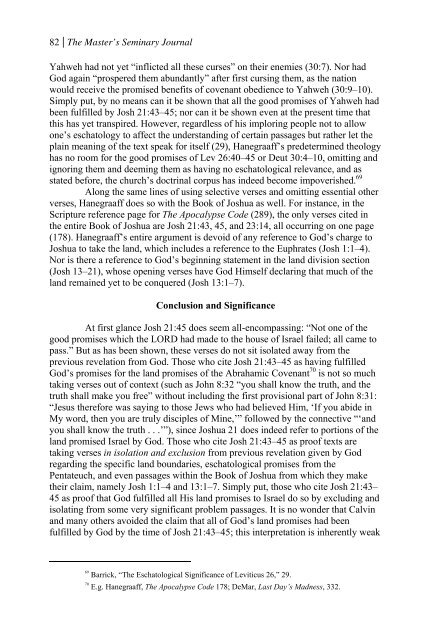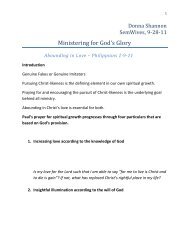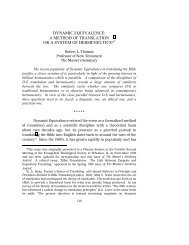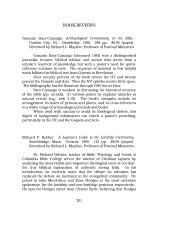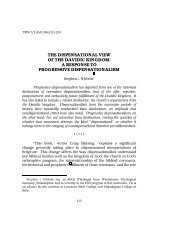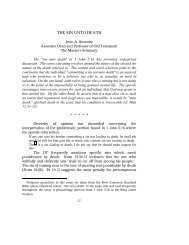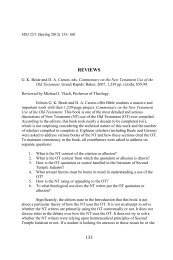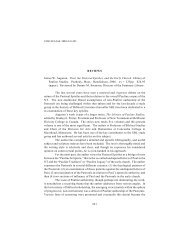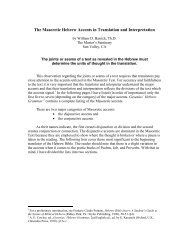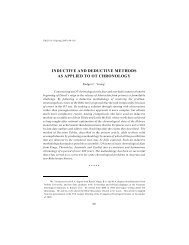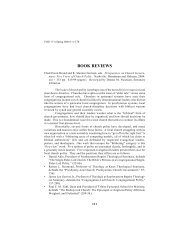Did God Fulfill Every Good Promise? - The Master's Seminary
Did God Fulfill Every Good Promise? - The Master's Seminary
Did God Fulfill Every Good Promise? - The Master's Seminary
Create successful ePaper yourself
Turn your PDF publications into a flip-book with our unique Google optimized e-Paper software.
82 | <strong>The</strong> Master’s <strong>Seminary</strong> JournalYahweh had not yet “inflicted all these curses” on their enemies (30:7). Nor had<strong>God</strong> again “prospered them abundantly” after first cursing them, as the nationwould receive the promised benefits of covenant obedience to Yahweh (30:9–10).Simply put, by no means can it be shown that all the good promises of Yahweh hadbeen fulfilled by Josh 21:43–45; nor can it be shown even at the present time thatthis has yet transpired. However, regardless of his imploring people not to allowone’s eschatology to affect the understanding of certain passages but rather let theplain meaning of the text speak for itself (29), Hanegraaff’s predetermined theologyhas no room for the good promises of Lev 26:40–45 or Deut 30:4–10, omitting andignoring them and deeming them as having no eschatological relevance, and asstated before, the church’s doctrinal corpus has indeed become impoverished. 69Along the same lines of using selective verses and omitting essential otherverses, Hanegraaff does so with the Book of Joshua as well. For instance, in theScripture reference page for <strong>The</strong> Apocalypse Code (289), the only verses cited inthe entire Book of Joshua are Josh 21:43, 45, and 23:14, all occurring on one page(178). Hanegraaff’s entire argument is devoid of any reference to <strong>God</strong>’s charge toJoshua to take the land, which includes a reference to the Euphrates (Josh 1:1–4).Nor is there a reference to <strong>God</strong>’s beginning statement in the land division section(Josh 13–21), whose opening verses have <strong>God</strong> Himself declaring that much of theland remained yet to be conquered (Josh 13:1–7).Conclusion and SignificanceAt first glance Josh 21:45 does seem all-encompassing: “Not one of thegood promises which the LORD had made to the house of Israel failed; all came topass.” But as has been shown, these verses do not sit isolated away from theprevious revelation from <strong>God</strong>. Those who cite Josh 21:43–45 as having fulfilled<strong>God</strong>’s promises for the land promises of the Abrahamic Covenant 70 is not so muchtaking verses out of context (such as John 8:32 “you shall know the truth, and thetruth shall make you free” without including the first provisional part of John 8:31:“Jesus therefore was saying to those Jews who had believed Him, ‘If you abide inMy word, then you are truly disciples of Mine,’” followed by the connective “‘andyou shall know the truth . . .’”), since Joshua 21 does indeed refer to portions of theland promised Israel by <strong>God</strong>. Those who cite Josh 21:43–45 as proof texts aretaking verses in isolation and exclusion from previous revelation given by <strong>God</strong>regarding the specific land boundaries, eschatological promises from thePentateuch, and even passages within the Book of Joshua from which they maketheir claim, namely Josh 1:1–4 and 13:1–7. Simply put, those who cite Josh 21:43–45 as proof that <strong>God</strong> fulfilled all His land promises to Israel do so by excluding andisolating from some very significant problem passages. It is no wonder that Calvinand many others avoided the claim that all of <strong>God</strong>’s land promises had beenfulfilled by <strong>God</strong> by the time of Josh 21:43–45; this interpretation is inherently weak69Barrick, “<strong>The</strong> Eschatological Significance of Leviticus 26,” 29.70E.g. Hanegraaff, <strong>The</strong> Apocalypse Code 178; DeMar, Last Day’s Madness, 332.


